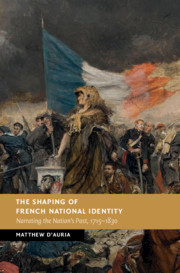Book contents
- The Shaping of French National Identity
- New Studies in European History
- The Shaping of French National Identity
- Copyright page
- Dedication
- Contents
- Acknowledgements
- Note on Sources
- Introduction
- Part I
- Part II
- Part III
- Chapter 7 Classifying the Nation
- Chapter 8 A Bourgeois National Narrative
- Chapter 9 Debating the Nation’s History:
- Conclusion About Renan
- Bibliography
- Index
Chapter 7 - Classifying the Nation
The Past(s) of ‘Social Classes’ before and after the Revolution
from Part III
Published online by Cambridge University Press: 05 December 2020
- The Shaping of French National Identity
- New Studies in European History
- The Shaping of French National Identity
- Copyright page
- Dedication
- Contents
- Acknowledgements
- Note on Sources
- Introduction
- Part I
- Part II
- Part III
- Chapter 7 Classifying the Nation
- Chapter 8 A Bourgeois National Narrative
- Chapter 9 Debating the Nation’s History:
- Conclusion About Renan
- Bibliography
- Index
Summary
Chapter 7 analyses in depth the notion of class, with a particular emphasis on its relationship with the understanding of the past. After a short semantic analysis of the term, the chapter examines the role of the physiocrats, A.R.J. Turgot, the abbé de Sieyès, and the Duke de Saint-Simon in shaping its modern meaning. In particular, the chapter considers the growing politicization of the term, arguing that, from the 1770s onwards, it was increasingly used to define historical actors endowed with their own, specific complex of memories, myths, and values. The chapter especially considers the role of the author of Qu’est-ce que le Tiers Etat in identifying a specific class – the Third Estate – with the whole of society, thus rejecting the hierarchical opposition mode of representation and arguing for a perfect identification between the ruling elite and the entire nation – almost prefiguring the Marxian ‘total class’. Examining the works of Saint-Simon, the chapter stresses the latter’s role in theorizing ‘class struggle’ as the real engine of history. As is shown, this led many authors of the Restoration period to consider classes as ethnic groups with a history and a memory of their own which historians had to ‘re-discover’.
- Type
- Chapter
- Information
- The Shaping of French National IdentityNarrating the Nation's Past, 1715–1830, pp. 249 - 290Publisher: Cambridge University PressPrint publication year: 2020

